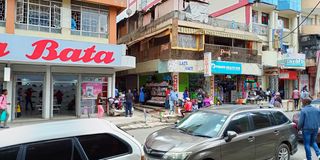Why Gusii road is a no-go zone for Nakuru men

A section of Gusii road in Nakuru city where twilight girls operate in broad daylight.
For men, walking through town often requires its own survival tactics: maintaining a straight face, avoiding eye contact and walking quickly past the ever-persistent brokers and hawkers. Locals call this silent rule “sura ya kazi”.
However, as I recently discovered, there are parts of Nakuru where even this rule doesn't apply.
One casual afternoon, I went for a stroll with a colleague to explore a new part of town. New to the city, I was keen to familiarise myself with its back streets. That’s how we ended up on Gusii Road, near the stretch between the Gituamba Building and Taidy’s Suites.
It was around 3pm the January sun beating down mercilessly when we realised we had taken a wrong turn.
A group of women in skimpy dresses were lined up along the narrow stretch, standing in doorways and against walls. Their intent was clear. We kept our eyes forward, determined to walk quickly and get to the other side.
“Karibuni, customers!” one of them shouted.
We ignored it.
Then came another: "Tubaki na huyo amevaa jeans ya black!" — referring to my friend.
“I want you, mrefu!” another called out, pointing at me.
At that moment, my heart rate spiked. I was ready to sprint at the slightest provocation.
Before we could react, another voice yelled, 'Acha mkwende huko, mnajifanya!' One minute we were customers; the next, outcasts.
By the time we reached the Ngata matatu terminus, we were too shaken up to laugh. My friend and I shared an awkward silence, as well as an unspoken agreement to never mention it again.
Locals refer to that area as 'no man's land'. It's an area where time slows down, rules change, and reputations are at stake.
Some colleagues later told me that men had been arrested there on suspicion of soliciting sexual favours from the women simply for walking by between 7pm and 9pm. Others recounted awkward encounters, such as bumping into a church member or work colleague just as they emerged from the alley tucking their shirts or adjusting their trousers. There's no way to explain your way out of that.
Humorous as this episode seems, it underscores a broader issue in Nakuru's fast-growing city centre: poor urban planning and a lack of pedestrian safety in certain areas. Many of these alleys serve as informal business zones by day and red-light districts by night, creating tension between residents, traders and law enforcement.
For women, the threat is more direct. Harassment and intimidation have made some routes practically impassable. Men, on the other hand, have to worry about their reputation, one wrong turn and they could find themselves embroiled in embarrassment or misunderstanding.
Until the city authorities step in to regulate and secure these spaces, the wisest choice for everyone is to stick to the main streets, Kenyatta Avenue, Moi Road and Oginga Odinga Avenue, and leave the mysterious alleyways to those who are brave enough.


